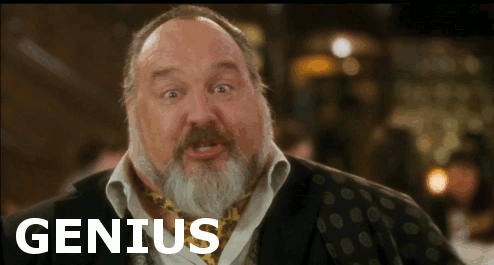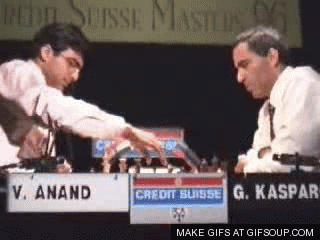My Quest To Become A Child Genius (Even Though I’m Already An Adult)
You're never too old to seek revenge on obnoxiously clever kids.

Genius is once again back in fashion — at least if G-Star Raw’s sponsorship of Magnus Carlsen is anything to go by. For those who don’t know, Carlsen is the highest-rated chess player to have ever lived, a model, and a 24-year-old. He’s been in the news lately for making apps, doing fashion shows, playing chess against Bill Gates (12-second checkmate), and generally doing whatever you’d do if you were a rock star of a board game.
The question worth asking, though, is not what happened to give Carlsen such a brooding pouty face, but how he got to be so brilliant.
–
How to breed genii
There’s more tension in the room than on Christmas Eve at an orphanage. It’s also what the room looks like, albeit with more clocks. The children are sitting straight and silent, although some are writing industriously — last minute wishlists, perhaps. The hall is large, and all six wall-mounted heaters are on. Kids are seated in pairs, a chessboard between them. The looks on their faces couldn’t be confused with those simply playing a game. The exceptions are two children: one, a girl of about fourteen; the other, much younger.
“And what are you going to do with the rest of your life?”, I ask one of the kids when the chess tournament is over.
“I’m going to be the best in the world, then I’m going to die.”
I work with these kids as a chess tutor. It’s intimidating, but I feel a whole gambit of other emotions, too: jealousy, respect, affection, concern. I came to chess because reading books at parties was no longer enough to prove my intellect. Without really thinking about the complexity of chess or the fact that there are more possible games than there are atoms in the universe, I figured it would be impressive to be able to beat most people, or you know, even play a game blindfolded.
Unfortunately, I didn’t count on those pesky kids.

Samuel Reshevsky (1911-1992)was beating accomplished players and giving chess exhibitions when he was eight. When I was eight, I drank an entire 3L bottle of Diet Coke before my mum found out.
–
If Todd Sampson can redesign his brain, you can too
Todd Sampson’s ABC program Redesign My Brain tested the possibilities of neurological play-dough (aka, ‘brain plasticity‘). The show’s first episode opened with a guy named Marc Lang playing 12 simultaneous chess games, blindfolded. He considered himself an ordinary guy (“Ask my wife,” he said); Todd Sampson, on the other hand, actually is.
The show wasn’t so much about training to be a genius, as it was about seeing if Sampson would be able to improve his memory and overall brain function. He did some juggling, played with mnemonics, and by the end of episode one (three months later in human time), he’d successfully memorised an entire deck of random playing cards.
This seemed impossible to me; I struggle with names I’ve heard five seconds ago. But world records show that it’s possible, with some people even competing in things like the ‘World Memory Championships’ for fun. After engaging my Facebook friends in memorisation challenges, I embarked on my own training adventure. I started using Lumosity.com daily, juggling on public transport, and cultivating ambidexterity.
But those genius kids were already way ahead.
–
Kids are scary, and so are their parents
If you ever want a quick and easy way to feel like you’ve done nothing with your life, a glance at Wikipedia’s list of child prodigies is just the ticket. It’s not all chess. There’s Taylor Ramon Wilson who, at 14, was the youngest person in the world to build a working nuclear fusion device. Then there’s some other punk who joined Mensa at the age of four. If you thought you were a social outcast because you were in the accelerated learning program, you should see these kids. Perhaps it’s due to raw talent or maybe it’s the intense parenting, but their brains are essentially bratty little sponges.
As if naming your kid after a dead grandmaster wasn’t enough, training him in chess from five-years old is pretty much the Masterchef recipe for no friends. Named after Russian chess champion Alexander Alekhine, Alekhine Nouri is now seven, which makes him the Philippines’ youngest chess master. As we all know, it’s important to help your kid follow your dreams, even if it means quitting your job to do so. “Our daily routine features ten hours of training; no computer games, no TV. We only ease up on Sundays,” father and personal coach Hamed Nouri said on Check Mates USA.
I like to imagine that they go out for a picnic or something on Sundays, or maybe play a more experimental form of chess. Still, at least he’s not being raised by Amy Chua, the Yale professor who popularised the ‘tiger mom’ school of parenting. Paul Tullis on Slate describes how this intensely restrictive and demanding form of “nurturing” includes “hours of forced music practice every day, severe restrictions on extracurriculars, [and] outright bans on social activities.”
But, you know, Chua’s daughter then made her Carnegie Hall piano debut at the age of 14, so…
–
I know! Let’s get together and breed child masterminds!
In what might seem like a scheme from some evil villain, a Hungarian psychologist in the ’60s named Laszlo Polgár wanted to see if he could raise child prodigies. He met a Ukrainian foreign language teacher named Klara and “conducted an epistolary courtship [where he] detailed a pedagogical experiment he was bent on carrying out with his future progeny…”. For some reason, this sounded romantic to Klara and they got married, had three kids, and set about crafting genii.
Surprisingly, it actually worked.
Through extensive home schooling and relentless chess training from an early age, their three children quickly became chess masters, with their youngest, Judit Polgár, being named “by far the strongest female chess player in history.” Winning blindfolded games at the age of five, she soon became both loved and feared in the male-dominated chess world, and known as the “cute little auburn-haired monster [that] crushed you.”
The other sisters aren’t bad, either. As well as being skilled at chess, all three are multilingual, while sister Susan Polgár can fluently speak seven languages. “He wanted to do something special,” Klara Polgár said about her husband’s strange but successful parenting techniques. “We wanted to experiment with the children.”
–
Experimenting on myself
Back home, I was learning to quickly differentiate between certain colours, click birds really fast, and juggle with one hand.
“Doing brain training doesn’t necessarily make you smarter. It just gets you better at doing brain training,” my housemate said, as he watched over my shoulder.
“Shut up, can’t you see I’m concentrating?”
But he was probably right: studies show that brain training improves memory, not intelligence. Earlier this year, Tyler Harrison from the School of Psychology at Georgia Institute of Technology was looking into neuroplasticity. His aim was to see if brain training really did improve fluid intelligence. The field is contentious, but Harrison’s results are quite critical of traditional training. “Brain training may increase your brain’s ‘RAM’”, a report on his findings states, “but it won’t improve your ability to solve problems.” Despite this, I continued to practice both chess and brain training, desperate for some kind of edge over these kids.
From the pure science of anecdote, I did notice some improvements over the following weeks but I didn’t feel as if suddenly everything was illuminated. I felt like I was slightly faster at noticing mistakes my chess opponents made and I’ve gotten pretty okay at juggling, but I’m not applying to Mensa just yet.
It’s a shame really, because I’m running out of time. It’s commonly understood that a child’s brain development in their early years is vastly superior to later in life, but most of it settles down by adolescence. The bad news for you and me is that by about the age of twenty-five, your brain stops developing. Apparently, there’s a bit of truth to that “old dog, new tricks” line. It’s hard to commit to your daily brain-training regimen when it just feels like a glorified inoculation against Alzheimer’s.
I overheard a statement at chess club a few weeks later.
“I don’t hang out with people at school. They’re all too stupid.”
“How old are you?” I asked.
“Seven.”
–
Rafael is a fiction and poetry writer, a founding member of ‘Dead Poets’ Fight Club’, and currently working on a series of articles for Going Down Swinging. He is also sometimes seen as a 1. f3 e5, 2. g4 Qh4#.



